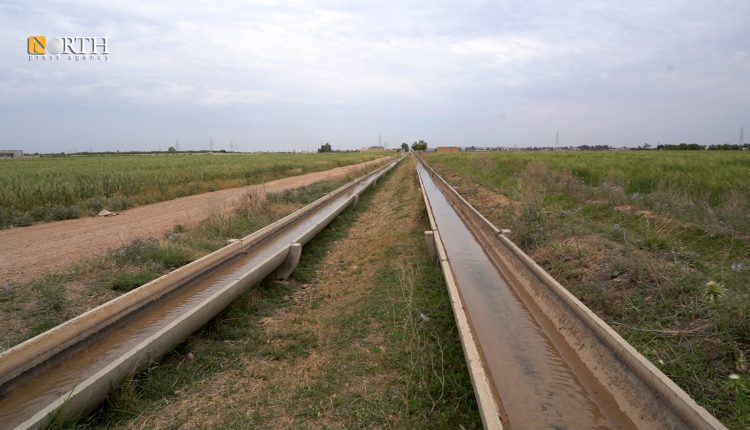By Zana Al-Ali
RAQQA, Syria (North Press) – Amid intensifying drought and the rapidly declining water levels of the Euphrates River, farmers in Raqqa are experiencing increasing hardships that threaten their livelihoods and the region’s agricultural sustainability. The water shortages, stemming from a sustained reduction in water flow from Turkey, are putting thousands of hectares of farmland at risk and could potentially precipitate a larger food security crisis in northeastern Syria.
For farmers like Ahmed Al-Hilal, the wait to irrigate crops has become a distressingly long ordeal. Al-Hilal, who relies on irrigation canals fed by the Euphrates Dam, says he often waits for days—sometimes up to ten—to water his wheat fields.
“Ten days ago, the water levels were still tolerable,” he told North Press. “The weather was cooler and more humid, which helped mitigate some of the effects. But now, as summer begins, the heat and dryness are compounding the impact of the water shortage. The crops are suffering badly.”
Al-Hilal farms in the Tenth Line area east of Hattin Farm, located north of Raqqa city. According to him, the area depends heavily on scheduled water rotations, but when it’s time for irrigation, the water levels are too low to adequately nourish the crops. This inconsistency threatens to destroy the entire growing season for local farmers.
Water Crisis Rooted in Policy and Climate
Since February 2020, Turkey has significantly reduced the flow of water into Syria via the Euphrates River, contrary to international water-sharing agreements. This long-term policy, coupled with recurrent drought and heatwaves across the region, has led to severe declines in river levels, hampering the function of irrigation systems that local agriculture depends on.
Mohammad Ibrahim, another farmer from the Kasrat region south of Raqqa, emphasized that the water scarcity has intensified their struggles amid the ongoing drought. “The irrigation isn’t properly organized,” he explained. “There are frequent issues with pump stations, and the water is not being distributed fairly.”
He recounts frequent disputes erupting between farmers over water allocation. “Sometimes one farmer uses more than his share, or delays the release of water, which sparks arguments. In one instance, my cousin couldn’t irrigate his land because another farmer diverted the water at the last moment. A fight broke out.”
Systemic Failures and Infrastructure Needs
The problem, farmers say, is not just the water itself, but also poor management of what limited resources remain. According to Ibrahim, irrigation supervisors often report that only one or two pumps are operational at a time, severely restricting water output and leading to frequent scheduling conflicts.
North Press obtained figures from the Raqqa Civil Council’s Irrigation Office, revealing that Raqqa hosts 25 pumping stations comprising 102 pumping units. Of these, 9 are currently non-functional due to damage or technical failures. Repairing these units requires financial resources beyond the capabilities of the local administration and calls for immediate support from international aid organizations.
Raqqa has approximately 96,000 hectares of irrigated agricultural land, of which 43,000 hectares rely directly on these pumping stations. The Balikh Canal, one of the primary irrigation conduits connected to the Tel Al-Saman Station, is 155 km long and irrigates a substantial portion of this land. Other key canals include:
- Lower Al-Salhabiyah Canal: 60 km long, irrigating 20,000 hectares
- Upper Al-Salhabiyah Canal: 25 km long, serving 3,000 hectares
- Bir Al-Hashm Canal: 20 km long, supporting 10,000 hectares
Most of these canals are in urgent need of maintenance, and delays in repairs are worsening the already fragile agricultural ecosystem.
Local Officials Raise Alarms
Sheikh Nabi Khalil, head of operations at Raqqa’s Irrigation Office, attributes the root cause of the crisis to the dramatic drop in the Euphrates Dam’s reservoir levels, which he links directly to Turkey’s restriction of water flow.
“We are currently drafting plans to reduce water waste,” Khalil told North Press. “We urge farmers to be mindful of how they irrigate their crops and to avoid water-intensive farming of crops like sesame, yellow corn, and watermelon seeds.”
He directed a strong appeal to the United Nations and international organizations, warning that continued water blockage by Turkey could lead to a full-scale food crisis in a region where agriculture is the main source of income and sustenance for thousands of families.
Regional and Political Dimensions
In late April 2025, the Autonomous Administration of North and East Syria (AANES) issued a dire warning that the Tabqa Dam could be rendered inoperative within a month if the drought and water shortage persist. The Tishrin Dam, another major hydropower and irrigation facility, had already gone offline in recent months due to ongoing conflict and operational damage.
AANES’s statement also criticized Turkey’s breach of international water agreements, noting that current inflows into Syria have dropped to just 250 cubic meters per second, barely half of the amount stipulated under previous bilateral accords with Iraq and Syria.
The administration emphasized that prolonged drought, combined with increased evaporation from shrinking reservoirs, has brought the Euphrates Lake down to a dangerous level of 298 meters above sea level—six meters below its optimal elevation of 304 meters.
What Lies Ahead
Without immediate and coordinated intervention, both domestically and internationally, the water crisis in Raqqa will likely escalate into a broader humanitarian emergency. Reduced crop yields could lead to soaring food prices, deepening economic hardship, and even population displacement if farming becomes untenable.
Local officials are calling on the Syrian government to engage directly with Turkish authorities to ensure compliance with previously signed water-sharing protocols. Meanwhile, farmers on the ground are left to contend with vanishing resources, inadequate infrastructure, and the growing risk of agricultural collapse.
Unless urgent steps are taken, Raqqa and its surrounding areas may soon face the grim reality of agricultural famine, underscoring the critical link between water security, food sovereignty, and regional stability.

